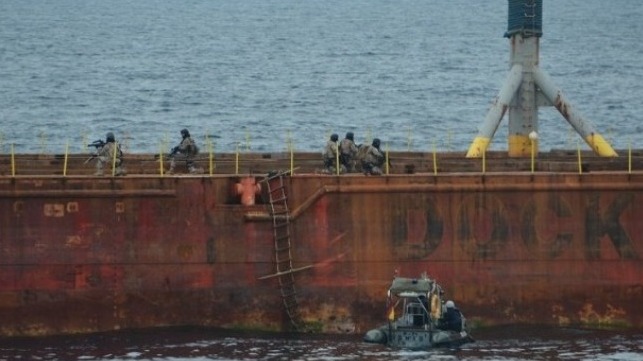Nigeria Pushes for Removal of War Risk Insurance for Gulf of Guinea

Authorities in Nigeria are pushing for the removal of the war risk insurance required for cargo vessels that call in the country due to the threat of piracy in the Gulf of Guinea.
Nigerian Maritime Administration and Safety Agency (Nimasa) Director General Bashir Jamoh has called on the international shipping community to remove the premiums, claiming that the country has demonstrated enough commitment towards tackling maritime insecurity in its territorial waters and the wider Gulf of Guinea. “We therefore invite the international shipping community to rethink the issue of war risk insurance on cargo bound for our ports,” he said.
He added the recent launch of the Integrated National Security and Waterways Protection Infrastructure, also known as the Deep Blue Project, is a clear commitment that Nigeria is tackling the piracy menace along its coasts.
Through the project, Nigeria has invested $195 million to acquire military and law enforcement infrastructure to secure its maritime domain along the Gulf of Guinea, an area blighted by piracy, armed robbery and other maritime crimes.
“Since the deployment of the deep blue project assets in February, there has been a steady decline in piracy attacks in the Nigerian waters on a monthly basis,” Jamoh noted.
Nigerian authorities contend that although piracy in the country’s waters is on the decline, marine insurers still insist on very high premiums for ships conveying cargo to Nigeria. Oceans Beyond Piracy’s 2020 report shows that the total cost of additional war risk area premiums incurred by Nigeria-bound ships transiting the Gulf of Guinea was $55 million in 2020, while 35 percent of ships transiting the area also carried additional kidnap and ransom insurance totaling $100 million.
War risk insurance is a type of insurance that covers damage due to acts of war, including invasion, insurrection, rebellion and hijacking. It has two components: war risk liability, which covers people and items inside the craft and is calculated based on the indemnity amount, and war risk hull, which covers the craft itself and is calculated based on the value of the craft. The premium varies based on the expected stability of the countries to which the vessel will travel.

that matters most
Get the latest maritime news delivered to your inbox daily.
West Africa has emerged as the global hot spot for piracy with the International Maritime Bureau recording 90 attempted and successful attacks in 2020. In the first three months of this year, the Gulf of Guinea accounted for nearly half of all reported piracy incidents (43 percent).
The total economic cost of piracy in West Africa has been estimated at a staggering $2.3 billion in the three-year period from 2015 to 2017, representing an annual loss of nearly $800 million.
